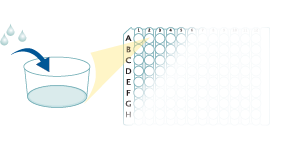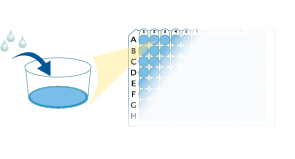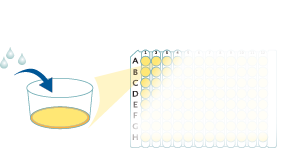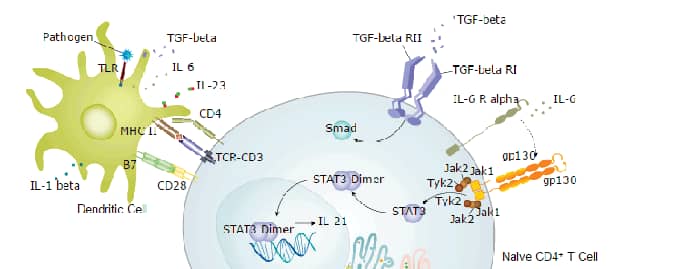Mouse IL-23 Quantikine ELISA Kit Summary
Product Summary
Precision
Cell Culture Supernates, Serum, Heparin Plasma
| Intra-Assay Precision | Inter-Assay Precision | |||||
|---|---|---|---|---|---|---|
| Sample | 1 | 2 | 3 | 1 | 2 | 3 |
| n | 20 | 20 | 20 | 40 | 40 | 40 |
| Mean (pg/mL) | 49.3 | 107 | 344 | 50.4 | 116 | 333 |
| Standard Deviation | 3.72 | 5.84 | 22.7 | 3.69 | 7.14 | 18.6 |
| CV% | 7.5 | 5.5 | 6.6 | 7.3 | 6.2 | 5.6 |
Recovery
The recovery of mouse IL-23 spiked to three levels throughout the range of the assay was evaluated.
| Sample Type | Average % Recovery | Range % |
|---|---|---|
| Cell Culture Supernates (n=4) | 103 | 99-108 |
| Heparin Plasma (n=4) | 99 | 88-117 |
| Serum (n=4) | 95 | 90-101 |
Linearity
Scientific Data
Product Datasheets
Preparation and Storage
Background: IL-23
IL-23 (Interleukin-23) is a disulfide-linked cytokine composed of a p19 subunit that is unique to IL-23 and a p40 subunit that is shared with IL-12. It is produced by activated macrophages, microglia, and monocyte-derived dendritic cells in response to pathogens. IL-23 induces the earliest recruitment of neutrophils to the site of infection and promotes the development and maintenance of Th17 cells. It also enhances the development of Th17 mediated autoimmunity and tumor progression. IL-23 signals through a receptor complex consisting of IL-12 R beta 1 and IL-23 R. This complex is expressed in mouse Th1 and Th2 cells, bone marrow dendritic cells, activated macrophages and CD4+ CD45Rb(low) memory T cells.
Assay Procedure
Refer to the product- Prepare all reagents, standard dilutions, and samples as directed in the product insert.
- Remove excess microplate strips from the plate frame, return them to the foil pouch containing the desiccant pack, and reseal.
- Add 50 µL of Assay Diluent to each well.
- Add 50 µL of Standard, Control, or sample to each well. Cover with a plate sealer, and incubate at room temperature for 2 hours on a horizontal orbital microplate shaker.
- Aspirate each well and wash, repeating the process 4 times for a total of 5 washes.
- Add 100 µL of Conjugate to each well. Cover with a new plate sealer, and incubate at room temperature for 2 hours on the shaker.
- Aspirate and wash 5 times.
- Add 100 µL Substrate Solution to each well. Incubate at room temperature for 30 minutes on the benchtop. PROTECT FROM LIGHT.
- Add 100 µL of Stop Solution to each well. Read at 450 nm within 30 minutes. Set wavelength correction to 540 nm or 570 nm.





Citations for Mouse IL-23 Quantikine ELISA Kit
R&D Systems personnel manually curate a database that contains references using R&D Systems products. The data collected includes not only links to publications in PubMed, but also provides information about sample types, species, and experimental conditions.
29
Citations: Showing 1 - 10
Filter your results:
Filter by:
-
Targeting dendritic cell-specific TNFR2 improves skin and joint inflammation in a murine model of psoriatic arthritis
Authors: Kaur, R;Lin, J;Harvey, JE;Brambilla, R;Chandrasekharan, UM;Husni, ME;
Scientific reports
Species: Mouse
Sample Types: Plasma
-
Senescence-induced p21high macrophages contributed to CD8+ T cells-related immune hyporesponsiveness in kidney transplantation via Zfp36/IL-27 axis
Authors: Zhu, T;Shen, Q;Shen, L;Wang, Y;Zhu, B;Ma, L;Feng, S;Wang, C;Yan, S;Li, J;Chen, Z;Zhou, J;Huang, H;Li, B;Shen, Z;Wang, Q;Wang, J;Gwinner, W;Scheffner, I;Rong, S;Yang, B;Wang, J;Haller, H;Han, X;Guo, G;Yin, Z;Jin, J;Lan, HY;Chen, J;Jiang, H;
Cell discovery
Species: Mouse
Sample Types: Cell Culture Supernates
-
Dengue virus infection induces selective expansion of V?4 and V?6TCR ?? T cells in the small intestine and a cytokine storm driving vascular leakage in mice
Authors: Kurosu, T;Okuzaki, D;Sakai, Y;Kadi, MA;Phanthanawiboon, S;Ami, Y;Shimojima, M;Yoshikawa, T;Fukushi, S;Nagata, N;Suzuki, T;Kamimura, D;Murakami, M;Ebihara, H;Saijo, M;
PLoS neglected tropical diseases
Species: Mouse
Sample Types: Serum
-
Therapeutic Efficacy of Mesenchymal Stem/Stromal Cell Small Extracellular Vesicles in Alleviating Arthritic Progression by Restoring Macrophage Balance
Authors: Zhang, B;Lai, RC;Sim, WK;Lim, SK;
Biomolecules
Species: Mouse
Sample Types: Plasma
-
Selective NF-kappaB inducing kinase inhibitor attenuates the onset of chronic periodontitis
Authors: J Wang, S Wu, Z Li, L Liu, Y Pang, J Wei
The international journal of biochemistry & cell biology, 2021-08-05;0(0):106052.
Species: Mouse
Sample Types: Cell Culture Supernates
-
V&gamma4 T cell-derived IL-17A is essential for amplification of inflammatory cascades in ischemic brain tissue after stroke
Authors: L Lu, Y Wang, L Zhou, Y Li, X Zhang, X Hu, S Shi, W He
International immunopharmacology, 2021-05-24;96(0):107678.
Species: Mouse
Sample Types: Tissue Homogenates
-
WLS/wntless is essential in controlling dendritic cell homeostasis via a WNT signaling-independent mechanism
Authors: LT Wang, MH Lin, KY Liu, SS Chiou, SN Wang, CY Chai, LW Tseng, HC Chiou, HC Wang, KK Yokoyama, SH Hsu, SK Huang
Autophagy, 2021-04-14;0(0):1-16.
Species: Mouse
Sample Types: Cell Culture Supernates
-
Topical Application of Mesenchymal Stem Cell Exosomes Alleviates the Imiquimod Induced Psoriasis-Like Inflammation
Authors: B Zhang, RC Lai, WK Sim, ABH Choo, EB Lane, SK Lim
International Journal of Molecular Sciences, 2021-01-13;22(2):.
Species: Mouse
Sample Types: Tissue Homogenates
-
Curcumin ameliorates DSS?induced colitis in mice by regulating the Treg/Th17 signaling pathway
Authors: C Wei, JY Wang, F Xiong, BH Wu, MH Luo, ZC Yu, TT Liu, DF Li, Q Tang, YX Li, DG Zhang, ZL Xu, HT Jin, LS Wang, J Yao
Mol Med Rep, 2020-11-12;23(1):.
Species: Mouse
Sample Types: Tissue Homogenates
-
Exacerbated Imiquimod-Induced Psoriasis-Like Skin Inflammation in IRF5-Deficient Mice
Authors: M Nakao, T Miyagaki, M Sugaya, S Sato
Int J Mol Sci, 2020-05-23;21(10):.
Species: Mouse
Sample Types: Cell Culture Supernates
-
Lactobacillus delbrueckii subsp. bulgaricus 2038 and Streptococcus thermophilus 1131 Induce the Expression of the REG3 Family in the Small Intestine of Mice via the Stimulation of Dendritic Cells and Type 3 Innate Lymphoid Cells
Authors: K Kobayashi, Y Honme, T Sashihara
Nutrients, 2019-12-07;11(12):.
Species: Mouse
Sample Types: Cell Culture Supernates
-
Fenoldopam mesylate for treating psoriasis: A new indication for an old drug
Authors: S Doppalapud, A Jain, W Khan, AJ Domb
Int J Pharm, 2019-11-09;0(0):118726.
Species: Mouse
Sample Types: Tissue Homogenates
-
Mesenchymal Stem Cells Alleviate Moderate-to-Severe Psoriasis by Reducing the Production of Type I Interferon (IFN-I) by Plasmacytoid Dendritic Cells (pDCs)
Authors: M Chen, J Peng, Q Xie, N Xiao, X Su, H Mei, Y Lu, J Zhou, Y Dai, S Wang, C Li, G Lin, L Cheng
Stem Cells Int, 2019-11-07;2019(0):6961052.
Species: Mouse
Sample Types: Cell Culture Supernates
-
Preventative effects of the partial RANKL peptide MHP1-AcN in a mouse model of imiquimod-induced psoriasis
Authors: N Ju, M Shimamura, H Hayashi, Y Ikeda, S Yoshida, A Nakamura, R Morishita, H Rakugi, H Nakagami
Sci Rep, 2019-10-28;9(1):15434.
Species: Mouse
Sample Types: Serum
-
Tumoral NOX4 recruits M2 tumor-associated macrophages via ROS/PI3K signaling-dependent various cytokine production to promote NSCLC growth
Authors: J Zhang, H Li, Q Wu, Y Chen, Y Deng, Z Yang, L Zhang, B Liu
Redox Biol, 2019-02-06;22(0):101116.
Species: Mouse
Sample Types: Cell Culture Supernates
-
Modulation of Gut Microbiota Composition by Serotonin Signaling Influences Intestinal Immune Response and Susceptibility to Colitis
Authors: YH Kwon, H Wang, E Denou, JE Ghia, L Rossi, ME Fontes, SP Bernier, MS Shajib, S Banskota, SM Collins, MG Surette, WI Khan
Cell Mol Gastroenterol Hepatol, 2019-02-01;0(0):.
Species: Mouse
Sample Types: Tissue Homogenates
-
RIG-I antiviral signaling drives interleukin-23 production and psoriasis-like skin disease
Authors: H Zhu, F Lou, Q Yin, Y Gao, Y Sun, J Bai, Z Xu, Z Liu, W Cai, F Ke, L Zhang, H Zhou, H Wang, G Wang, X Chen, H Zhang, Z Wang, F Ginhoux, C Lu, B Su, H Wang
EMBO Mol Med, 2017-05-01;9(5):589-604.
Species: Mouse
Sample Types: Tissue Homogenates
-
Central Role of IL-23 and IL-17 Producing Eosinophils as Immunomodulatory Effector Cells in Acute Pulmonary Aspergillosis and Allergic Asthma.
Authors: Guerra E, Lee C, Specht C, Yadav B, Huang H, Akalin A, Huh J, Mueller C, Levitz S
PLoS Pathog, 2017-01-17;13(1):e1006175.
Species: Mouse
Sample Types: BALF
-
Depletion of Foxp3+ regulatory T cells increases severity of mechanical allodynia and significantly alters systemic cytokine levels following peripheral nerve injury.
Authors: Lees J, Duffy S, Perera C, Moalem-Taylor G
Cytokine, 2014-11-20;71(2):207-14.
Species: Mouse
Sample Types: Serum
-
Endogenous n-3 polyunsaturated fatty acids protect against imiquimod-induced psoriasis-like inflammation via the IL-17/IL-23 axis.
Authors: Qin S, Wen J, Bai X, Chen T, Zheng R, Zhou G, Ma J, Feng J, Zhong B, Li Y
Mol Med Rep, 2014-04-09;9(6):2097-104.
Species: Mouse
Sample Types: Serum
-
Steady-state neutrophil homeostasis is dependent on TLR4/TRIF signaling.
Authors: Bugl S, Wirths S, Radsak M, Schild H, Stein P, Andre M, Muller M, Malenke E, Wiesner T, Marklin M, Frick J, Handgretinger R, Rammensee H, Kanz L, Kopp H
Blood, 2012-12-05;121(5):723-33.
Species: Mouse
Sample Types: Plasma
-
Human mesenchymal stem/stromal cells cultured as spheroids are self-activated to produce prostaglandin E2 that directs stimulated macrophages into an anti-inflammatory phenotype.
Authors: Ylostalo J, Bartosh T, Coble K, Prockop D
Stem Cells, 2012-10-01;30(10):2283-96.
Species: Mouse
Sample Types: Cell Culture Supernates
-
Elevating body temperature enhances hematopoiesis and neutrophil recovery after total body irradiation in an IL-1-, IL-17-, and G-CSF-dependent manner.
Blood, 2012-07-17;120(13):2600-9.
Species: Mouse
Sample Types: Tissue Homogenates
-
A protective role for human IL-10-expressing CD4+ T cells in colitis.
J. Immunol., 2012-06-29;189(3):1243-52.
Species: Mouse
Sample Types: Tissue Homogenates
-
Co-adjuvant effects of retinoic acid and IL-15 induce inflammatory immunity to dietary antigens.
Authors: DePaolo RW, Abadie V, Tang F
Nature, 2011-02-09;471(7337):220-4.
Species: Mouse
Sample Types: Cell Culture Supernates
-
Morphine Inhibits Murine Dendritic Cell IL-23 Production by Modulating Toll-like Receptor 2 and Nod2 Signaling.
Authors: Wang J, Ma J, Charboneau R
J. Biol. Chem., 2011-01-18;286(12):10225-32.
Species: Mouse
Sample Types: Cell Culture Supernates
-
Influenza A inhibits Th17-mediated host defense against bacterial pneumonia in mice.
Authors: Kudva A, Scheller EV, Robinson KM
J. Immunol., 2010-12-22;186(3):1666-74.
Species: Mouse
Sample Types: BALF
-
Morphine disrupts interleukin-23 (IL-23)/IL-17-mediated pulmonary mucosal host defense against Streptococcus pneumoniae infection.
Authors: Ma J, Wang J, Wan J, Charboneau R, Chang Y, Barke RA, Roy S
Infect. Immun., 2009-12-07;78(2):830-7.
Species: Mouse
Sample Types: BALF
-
CXCL12 (SDF-1alpha) suppresses ongoing experimental autoimmune encephalomyelitis by selecting antigen-specific regulatory T cells.
Authors: Meiron M, Zohar Y, Anunu R, Wildbaum G, Karin N
J. Exp. Med., 2008-10-13;205(11):2643-55.
Species: Mouse
Sample Types: Cell Culture Supernates
FAQs
-
Assay Diluent RD1-14 contains visible precipitate. Is this acceptable to use?
A small amount of precipitate is expected and acceptable in Assay Diluent RD1-14. Variability has been observed between vials and diluent lots. It may not fully resolubilize but this will not impact assay performance. It is not recommended to filter the precipitate.
Reviews for Mouse IL-23 Quantikine ELISA Kit
Average Rating: 4.7 (Based on 3 Reviews)
Have you used Mouse IL-23 Quantikine ELISA Kit?
Submit a review and receive an Amazon gift card.
$25/€18/£15/$25CAN/¥75 Yuan/¥2500 Yen for a review with an image
$10/€7/£6/$10 CAD/¥70 Yuan/¥1110 Yen for a review without an image
Filter by:








